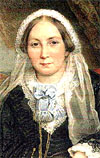


Please Contact Us if you have any questions or to report any problems.
PITHY QUOTE FROM Women's Sensation Fiction
I don’t like the plan of introducing you, my readers, to so many people, raising so many interests, as it were; but this temporary sojourn of Eleanor Seymour at the school was to bear its fruit, not pleasant fruit for Rose, and you must hear of it, for you would never understand her character so well otherwise: not if I wrote pages and pages.
Varieties of Women's Sensation Fiction, 1855-1890. Volume 3, Gothic Sensationalism. St Martin’s Eve (1866), Vol. I.
Varieties of Women's Sensation Fiction, 1855-1890. Electronic Edition.
ISBN: 978-1-57085-178-0
Language: English
|
Mrs Henry Wood. Detail: The miniature by Reginald Easton taken from Memorials (1894)
|
List of ContentsVarieties of Women's Sensation Fiction, 1855-1890. General editor, Andrew Maunder. Consulting editor, Sally Mitchell. 6 vols. London: Pickering & Chatto, 2004.
|
. . . it is hard to imagine any other way of examining a collected correspondence. . . . These electronic versions should be accessible to all levels of readers; they are essential for specialists. |
